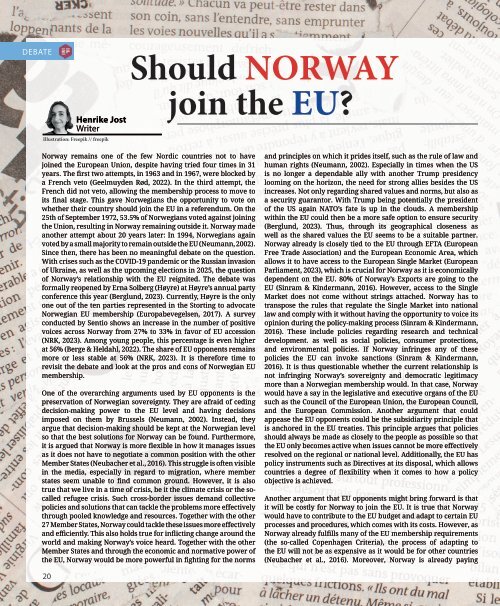NOVEMBER_UNIKUM_WEB
You also want an ePaper? Increase the reach of your titles
YUMPU automatically turns print PDFs into web optimized ePapers that Google loves.
DEBATE<br />
Henrike Jost<br />
Writer<br />
Illustration: Freepik // freepik<br />
Should NORWAY<br />
join the EU?<br />
Norway remains one of the few Nordic countries not to have<br />
joined the European Union, despite having tried four times in 31<br />
years. The first two attempts, in 1963 and in 1967, were blocked by<br />
a French veto (Geelmuyden Rød, 2022). In the third attempt, the<br />
French did not veto, allowing the membership process to move to<br />
its final stage. This gave Norwegians the opportunity to vote on<br />
whether their country should join the EU in a referendum. On the<br />
25th of September 1972, 53.5% of Norwegians voted against joining<br />
the Union, resulting in Norway remaining outside it. Norway made<br />
another attempt about 20 years later: In 1994, Norwegians again<br />
voted by a small majority to remain outside the EU (Neumann, 2002).<br />
Since then, there has been no meaningful debate on the question.<br />
With crises such as the COVID-19 pandemic or the Russian invasion<br />
of Ukraine, as well as the upcoming elections in 2025, the question<br />
of Norway’s relationship with the EU reignited. The debate was<br />
formally reopened by Erna Solberg (Høyre) at Høyre’s annual party<br />
conference this year (Berglund, 2023). Currently, Høyre is the only<br />
one out of the ten parties represented in the Storting to advocate<br />
Norwegian EU membership (Europabevegelsen, 2017). A survey<br />
conducted by Sentio shows an increase in the number of positive<br />
voices across Norway from 27% to 33% in favor of EU accession<br />
(NRK, 2023). Among young people, this percentage is even higher<br />
at 56% (Berge & Heldahl, 2022). The share of EU opponents remains<br />
more or less stable at 56% (NRK, 2023). It is therefore time to<br />
revisit the debate and look at the pros and cons of Norwegian EU<br />
membership.<br />
One of the overarching arguments used by EU opponents is the<br />
preservation of Norwegian sovereignty. They are afraid of ceding<br />
decision-making power to the EU level and having decisions<br />
imposed on them by Brussels (Neumann, 2002). Instead, they<br />
argue that decision-making should be kept at the Norwegian level<br />
so that the best solutions for Norway can be found. Furthermore,<br />
it is argued that Norway is more flexible in how it manages issues<br />
as it does not have to negotiate a common position with the other<br />
Member States (Neubacher et al., 2016). This struggle is often visible<br />
in the media, especially in regard to migration, where member<br />
states seem unable to find common ground. However, it is also<br />
true that we live in a time of crisis, be it the climate crisis or the socalled<br />
refugee crisis. Such cross-border issues demand collective<br />
policies and solutions that can tackle the problems more effectively<br />
through pooled knowledge and resources. Together with the other<br />
27 Member States, Norway could tackle these issues more effectively<br />
and efficiently. This also holds true for inflicting change around the<br />
world and making Norway’s voice heard. Together with the other<br />
Member States and through the economic and normative power of<br />
the EU, Norway would be more powerful in fighting for the norms<br />
and principles on which it prides itself, such as the rule of law and<br />
human rights (Neumann, 2002). Especially in times when the US<br />
is no longer a dependable ally with another Trump presidency<br />
looming on the horizon, the need for strong allies besides the US<br />
increases. Not only regarding shared values and norms, but also as<br />
a security guarantor. With Trump being potentially the president<br />
of the US again NATO’s fate is up in the clouds. A membership<br />
within the EU could then be a more safe option to ensure security<br />
(Berglund, 2023). Thus, through its geographical closeness as<br />
well as the shared values the EU seems to be a suitable partner.<br />
Norway already is closely tied to the EU through EFTA (European<br />
Free Trade Association) and the European Economic Area, which<br />
allows it to have access to the European Single Market (European<br />
Parliament, 2023), which is crucial for Norway as it is economically<br />
dependent on the EU. 80% of Norway’s Exports are going to the<br />
EU (Sinram & Kindermann, 2016). However, access to the Single<br />
Market does not come without strings attached. Norway has to<br />
transpose the rules that regulate the Single Market into national<br />
law and comply with it without having the opportunity to voice its<br />
opinion during the policy-making process (Sinram & Kindermann,<br />
2016). These include policies regarding research and technical<br />
development. as well as social policies, consumer protections,<br />
and environmental policies. If Norway infringes any of these<br />
policies the EU can invoke sanctions (Sinram & Kindermann,<br />
2016). It is thus questionable whether the current relationship is<br />
not infringing Norway’s sovereignty and democratic legitimacy<br />
more than a Norwegian membership would. In that case, Norway<br />
would have a say in the legislative and executive organs of the EU<br />
such as the Council of the European Union, the European Council,<br />
and the European Commission. Another argument that could<br />
appease the EU opponents could be the subsidiarity principle that<br />
is anchored in the EU treaties. This principle argues that policies<br />
should always be made as closely to the people as possible so that<br />
the EU only becomes active when issues cannot be more effectively<br />
resolved on the regional or national level. Additionally, the EU has<br />
policy instruments such as Directives at its disposal, which allows<br />
countries a degree of flexibility when it comes to how a policy<br />
objective is achieved.<br />
Another argument that EU opponents might bring forward is that<br />
it will be costly for Norway to join the EU. It is true that Norway<br />
would have to contribute to the EU budget and adapt to certain EU<br />
processes and procedures, which comes with its costs. However, as<br />
Norway already fulfills many of the EU membership requirements<br />
(the so-called Copenhagen Criteria), the process of adapting to<br />
the EU will not be as expensive as it would be for other countries<br />
(Neubacher et al., 2016). Moreover, Norway is already paying<br />
20

















